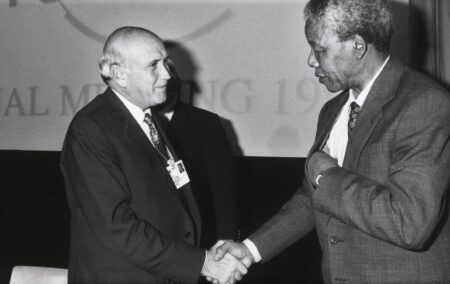There is a flurry of retrospective judgements on the character and achievements of F W de Klerk, whose amazing speech 30 years ago this month ended apartheid. Many of the judgements belittle or even condemn him. In parliament before the State of the Nation Address, Julius Malema, whose hero, Robert Mugabe, slaughtered over 20 000 black people in the 1980s, referred to De Klerk as a ‘murderer’ and ‘a man with blood on his hands’. My judgement of De Klerk is different. I now have a much higher opinion of him than before. I think his courage, skill and statesmanship have been greatly under-valued. Without him we might now be living in a much worse South Africa.
Here is a brief history of the fall of apartheid. The Soweto riots of 1976 came as a terrible shock to two parties, the ruling National Party and the outlawed African National Congress. The leaders of the NP stopped believing in the fiction that apartheid could ever bring happiness. They began their clumsy and faltering reforms. The ANC realised to their horror that they had lost all power over the black masses, which had gone to the PAC and Black Power movements. They embarked on a reign of terror, the ‘People’s War’, using strategies suggested by Communist Vietnam. The terror was directed almost entirely against ordinary black people. The more the NP reformed, the more violent the ANC became as they feared another black party might take over when apartheid ended. One of the tactics adopted by the ANC was ‘necklacing’, the placing of a petrol-filled tyre around the neck of a victim and then setting fire to it. Winnie Mandela gloated with delight as poor black people were roasted to death. Poor school children were threatened with necklacing if they attended school – while the children of the ANC elite were sent to posh private schools in Europe.
On the other side, which I saw at first hand, a massive resistance to the reforms of Vorster and Botha built up among the white supporters of apartheid, especially working-class Afrikaners. When De Klerk became president in September 1989, hard-line white resistance increased further. The Conservative Party, which wanted to keep old style apartheid, won more and more votes. When De Klerk made his famous speech in February 1990, the white reactionaries were horrified. I happened to be working in a power station in the Eastern Transvaal and a paper mill in Richards Bay during these years and heard the views of the white artisans, technicians and operators. They thought De Klerk was a traitor. I attended rallies of Eugene Terre’Blanche and heard the applause for him. In retrospect, he seems a laughable windbag, but he didn’t to many at the time.
To make that speech De Klerk needed great courage and acute judgement. He was greatly assisted by the fall of communism in Russia and East Europe. But it was by no means obvious he could retain his power among the while rulers after announcing he would unban the ANC and release Mandela. There was a growing number of ‘verligtes’ who supported his reforms but there was also a growing number of ‘verkramptes’ who opposed them, and these people controlled most of the police and the armed forces, most factories and power stations, and most of the state-owned enterprises – in other words huge physical force. The ANC was good at terrorising poor black people but utterly useless at fighting the armed might of apartheid. The apartheid hard-liners knew they could hold power by force indefinitely, awful though that might be for the country.
In 1992, while the CODESA negotiations were proceeding slowly and painfully, the NP lost three sensational by-elections, including Potchefstroom, to the CP. It seemed that white people did not support De Klerk’s reforms. He then played one of the political master strokes of the 20th century, which again required enormous courage and skill. He called for a white referendum, asking the simple question: ‘Do you support continuation of the reform process …?’ It was a huge gamble but a calculated one (he did have the media on his side). It threw the verkramptes into disarray. The vote was two to one in favour of continued reforms. He now had full moral authority – from white people only, but they were the ones in power.
I haven’t space for arguments about who won the negotiations but I can’t really think of a much better final outcome. People who expected ANC rule to bring universal prosperity and happiness were just fooling themselves, as any glance into the ANC’s history would have shown them. But it hasn’t been nearly as bad as majority rule in most other African countries. In retrospect, my regard for Nelson Mandela remains constant: he was brave, dignified, magnanimous and graceful, and poured a healing balm over a troubled land when he came to power; a great man – if not a great president. In retrospect, my regard for F W de Klerk continues to rise.
[Picture: World Economic Forum, https://commons.wikimedia.org/w/index.php?curid=5685512]
The views of the writer are not necessarily the views of the Daily Friend or the IRR
If you like what you have just read, become a Friend of the IRR if you aren’t already one by SMSing your name to 32823 or clicking here. Each SMS costs R1. Terms & Conditions Apply.
1. The full referendum question was: ‘Do you support continuation of the reform process which the State President began on 2 February 1990 and which is aimed at a new Constitution through negotiation?’

